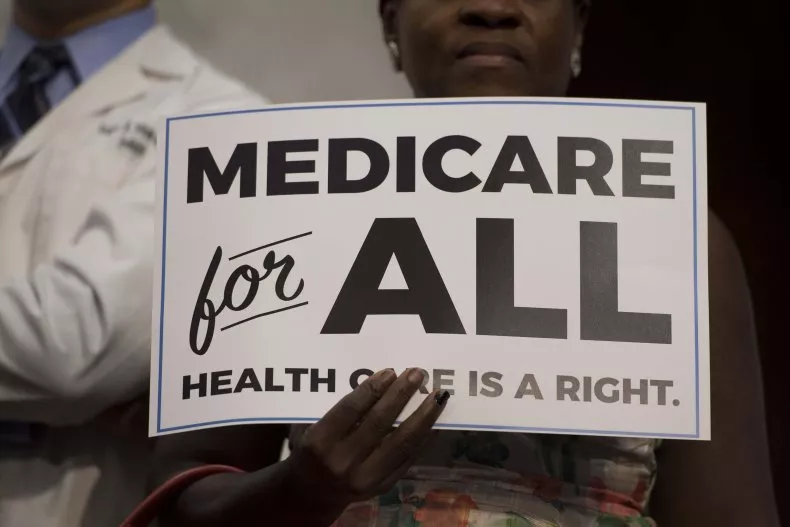69 PERCENT OF AMERICANS WANT MEDICARE FOR ALL, INCLUDING 46 PERCENT OF REPUBLICANS, NEW POLL SAYS
A newly released poll shows that 69 percent of registered voters support Medicare for All, a plan which would create a national health insurance plan available for all Americans.
The poll also showed 46 percent of Republican voters supporting Medicare for All alongside 88 percent of Democrats and 68 percent of Independents.
While several publications have wondered whether the coronavirus epidemic has bolstered support for a national health insurance plan, the poll found that Democratic support remained steady from a similar poll conducted in 2018, rising only two percentage points since then.
Support among Independents remained unchanged, and Republican support actually dropped 6 percentage points from 2018 to 2020.
The poll was conducted by the Washington, D.C. newspaper The Hill and the market research company HarrisX.
The coronavirus epidemic has raised awareness about flaws in the American health insurance system as many people who lost their jobs due to stay-at-home and social distancing measures also lost their health insurance. Without insurance, many Americans fear getting sick or injured because of the potentially devastating financial impact it could have.
Tying insurance to employment also burdens businesses with healthcare and insurance administration costs that can be expensive and time-consuming, according to The Wall Street Journal. Employment-based insurance also reduces wages and increases overhead as insurance premiums and deductibles continue to rise, according to the New York Times.
However, despite Medicare for All being touted by former Democratic presidential frontrunner Vermont Senator Bernie Sanders, House Speaker Nancy Pelosi and other Senate Democrats focused on healthcare reform have dismissed it, mostly because a national overhaul would remove whatever insurance Americans currently have, creating widespread instability and insecurity.
Many critics of Medicare for All worry also about "rationed" care that discriminates against sicker patients, an overall decline in the quality of care or the high taxes that would be required to fund such an overhaul. Furthermore, a national healthcare plan would only improve health outcomes if it coincided with large investments in local health centers and outreach efforts to make medical care more widely accessible and preventative.
The healthcare reform plan touted by presumptive Democratic Presidential nominee Joe Biden would leave employer-based health insurance plans intact while also adding a subsidized, Medicare-based public option for small businesses and individuals. However, large employers and their employees wouldn't be able to buy into his public option.
A February 26 report by the Committee for a Responsible Federal Budget estimated that the 10-year cost of Biden's plan would be $2.25 trillion while Sanders' Medicare for All plan would cost $30.6 trillion.
The poll also showed 46 percent of Republican voters supporting Medicare for All alongside 88 percent of Democrats and 68 percent of Independents.
While several publications have wondered whether the coronavirus epidemic has bolstered support for a national health insurance plan, the poll found that Democratic support remained steady from a similar poll conducted in 2018, rising only two percentage points since then.
Support among Independents remained unchanged, and Republican support actually dropped 6 percentage points from 2018 to 2020.
The poll was conducted by the Washington, D.C. newspaper The Hill and the market research company HarrisX.
The coronavirus epidemic has raised awareness about flaws in the American health insurance system as many people who lost their jobs due to stay-at-home and social distancing measures also lost their health insurance. Without insurance, many Americans fear getting sick or injured because of the potentially devastating financial impact it could have.
Tying insurance to employment also burdens businesses with healthcare and insurance administration costs that can be expensive and time-consuming, according to The Wall Street Journal. Employment-based insurance also reduces wages and increases overhead as insurance premiums and deductibles continue to rise, according to the New York Times.
However, despite Medicare for All being touted by former Democratic presidential frontrunner Vermont Senator Bernie Sanders, House Speaker Nancy Pelosi and other Senate Democrats focused on healthcare reform have dismissed it, mostly because a national overhaul would remove whatever insurance Americans currently have, creating widespread instability and insecurity.
Many critics of Medicare for All worry also about "rationed" care that discriminates against sicker patients, an overall decline in the quality of care or the high taxes that would be required to fund such an overhaul. Furthermore, a national healthcare plan would only improve health outcomes if it coincided with large investments in local health centers and outreach efforts to make medical care more widely accessible and preventative.
The healthcare reform plan touted by presumptive Democratic Presidential nominee Joe Biden would leave employer-based health insurance plans intact while also adding a subsidized, Medicare-based public option for small businesses and individuals. However, large employers and their employees wouldn't be able to buy into his public option.
A February 26 report by the Committee for a Responsible Federal Budget estimated that the 10-year cost of Biden's plan would be $2.25 trillion while Sanders' Medicare for All plan would cost $30.6 trillion.
69 PERCENT OF AMERICANS WANT MEDICARE FOR ALL, INCLUDING 46 PERCENT OF REPUBLICANS, NEW POLL SAYS
![69 PERCENT OF AMERICANS WANT MEDICARE FOR ALL, INCLUDING 46 PERCENT OF REPUBLICANS, NEW POLL SAYS]() Reviewed by Your Destination
on
April 25, 2020
Rating:
Reviewed by Your Destination
on
April 25, 2020
Rating:




